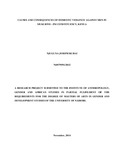| dc.description.abstract | This research project describes the work undertaken in Mukurwe-ini concerning Domestic
Violence Against Men (DVM). The research was carried out in October 2014. The research
question explored the causes of physical violence against men in Mukurwe-ini and investigated
the consequences of violence against men in the study area from the victims of female
perpetrated domestic violence with the focus on understanding the surrounding issues of society,
local authority and masculinity. From the in depth qualitative interviews conducted, the findings
conclude that the help and support available for male victims is virtually nonexistent and that
which exist is of poor quality.
The study randomly selected a sample of 22 men from the study population for the survey. In
addition, the study interviewed Key informants who were the Deputy County commissioner and
the OCPD in Mukurwe-ini. Qualitative data collected from open ended questions and from the
key informants was analyzed through thematic analysis while Quantitative data collected from
closed ended questions was analyzed by the use Statistical Package for Social Sciences (SPSS
Version 21) and the data presented by use of descriptive statistics such as percentages, means,
standard deviations and frequencies.
The findings and literature in this area suggest the underlying reason for why men are battered,
due to patriarchal society and the relevant authorities’ not actively recognizing domestic violence
to be a male issue as well as a female issue, their only focus is towards female victims. Therefore
male victims remain invisible. This societal repression has created stereotypes that impact upon
the way authorities deal with domestic violence cases, in that they tend to discriminate against
male victims. These stereotypes and discrimination cause male victims to feel reluctant to seek
help. So, in turn, it seems domestic violence towards men is not a widespread problem hence
there is no pressure for change. However this is not the case. This research piece develops these
arguments fully to provide insight into the taboo subject of domestic violence against males. | en_US |

